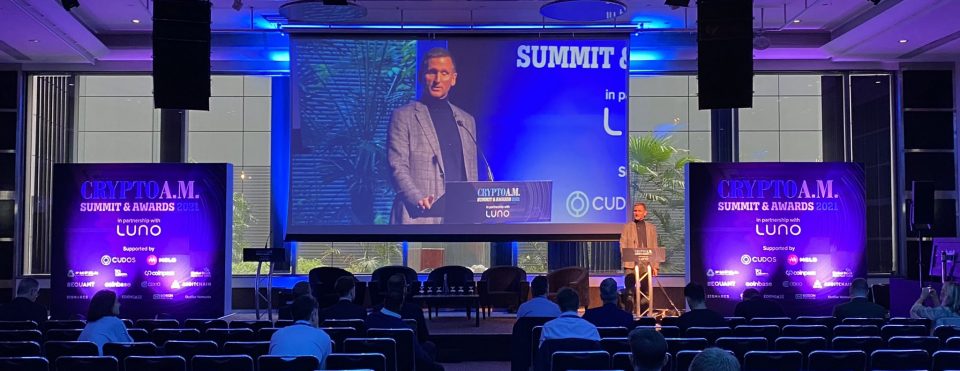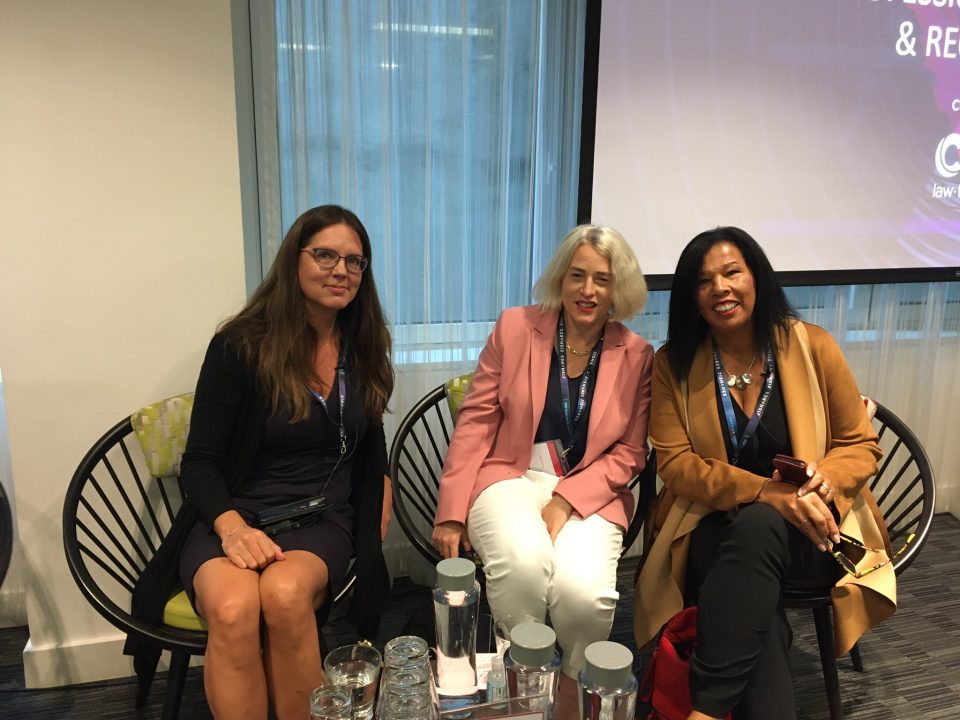Crypto Summit LIVE: Updates from the heart of the City

Day 2
Yesterday, we were treated to keynote talks from Lord Chris Homes MBE, member of the House of Lords, Marcus Hughes of Coinbase and Alderman William Russell, Lord Mayor of The City of London and more!
The day was topped off with an awards ceremony held at St Leonardo’s hotel in London.
Closing thoughts
In the final speech of the day Chris Hughes, the managing director of Coinbase, shared why he feels positive about the future of crypto.
Hughes pointed to the burgeoning adoption of crypto during the pandemic as proof of things to come.
“You can connect people to financial services in a way that would never have been possible before,” said Hughes, who claimed that one of crypto’s most compelling use cases is to offer banking services to people in developing economies.
Democratising financial services
Auditchain’s Jason Meyers also spoke powerfully on the ability of blockchain solutions to help democratise financial services.
Auditchain, an audit company which uses decentralized financial reporting infrastructure, wants to change the structure of the accounting industry.
“If you look at the world’s business and financial information as if it were a blockchain there are only four nodes who subjectively and tentatively validate the data,” Meyers said, questioning the security of a system where the four biggest accounting firms validate 90 per cent of the business world’s financial data.
Regulation
Panelists from Coinbase, The London Stock Exchange Group and Ziglu shared their views on where regulation is heading in the crypto space.
Coinbase says
“Absolutely crypto needs to be regulated,” said Claire Wells of Coinbase. “But let’s be really clear what falls within crypto.”
Wells called for regulators to make a clear distinction between financial services, currency and tech.
“Regulators need to be really careful that they are regulating the services, but not the underlying tech,” said Wells, saying that there’s a “real danger” regulators could stifle innovation with a blanket ban on tech.

The right approach
Dotun Rominiyi of the London Stock Exchange Group echoed Wells’ comments.
He said “the risk based approach that the FCA has taken is probably the right one.”
“Every market is different and every market has different needs,” he added, saying he is confident that “Over the next five years we will see more success in delivering those solutions.”
Banks Hate Crypto
A healthy debate broke out as Mark Hipperson questioned what right the FCA has, as a “mouthpiece for banks,” to oversee crypto transactions.
“Why do you need to oversee my money and me moving my money, that’s not fair,” said Hipperson.
“Banks hate crypto like cinemas hate Netflix and hotels hate Airbnb,” he added. “Banks don’t want crypto to succeed.”
Decentralized Finance
Crypto experts sang the praises of the metaverse at this afternoon’s panel on the future of decentralized finance.
“We have DeFi, but the metaverse is the next big thing,” said Stefania Barbaglio of Cassiopeia Services.
Panelist Patrick Martin was similarly enthused about what the metaverse offers to users.
“It’s a universe,” said Martin. “A concept of alternative reality.”
Brave new world
Martin explained that the metaverse already exists in certain computer games where people meet together and play in digitally constructed worlds.
“The next step is to make this not just a game, but to be able to spend your time in virtual reality where you can transact with people, meet and talk and have relationships with people without being in the same place,” said Martin.
The panelists said they hope that the metaverse will democratise access to experiences like travel, art and culture through making them accessible via a virtual reality headset.
Panel chair, Dr Maxine Room, was less convinced.
“People are constrained by education and qualifications,” said Dr Room who sees financial literacy as a barrier to widespread uptake of crypto.
Exclusive: MELD to launch gold-backed stablecoin
MELD chairman Ken Olling has exclusively announced plans to launch a gold-backed stablecoin on the Cardano network as part of plans to democratise access to crypto.
The coin will be rolled out through a three way partnership between MELD, Tingo Holdings, Nigeria’s largest mobile network, and Ubuntu Tribe, an ethical crypto company which tokenises natural resources.
“Our goal here is simplicity and clarity,” said Olling, who wants to make trading accessible to anyone with a mobile. “Gold will be stored in a vault, tokenized and then fractionalised and divided so we can sell it.”
“Its a simple idea, but incredibly powerful because you can count on it,” said Olling, pointing to gold’s stable value as proof that it would make a solid base for a digital asset.
The Future of Money
In the first panel event of the day speakers heading up crypto exchange platforms disagreed over the rate of crypto adoption.
“The direction of travel is towards things being more regulated and consistent,” said Nick Jones of Zumo.
“On the internet timeline it’s 1999 and we’re about to have consolidation,” Jones continued, arguing that the industry is reaching a tipping point where mass adoption is encouraging regulators to facilitate safe use.
‘Give humanity its power back’

Mamadou Kwidjim Touré of Ubuntu Tribe said that hurdles still stand in the way of mass adoption.
“There’s been so many barriers and layers to really onboard,” said Touré, adding that mass adoption could increase “once you have access to funding which is not a traditional model.”
Touré also stressed the huge potential of crypto currency for un-banked individuals in developing economies.
“Even if you are stuck in your own national economy you can access another one online which gives you the ability to trade,” he added. “Its a huge opportunity to give humanity its power back.”
Central Bank Digital Currency
Konstantin Anissimov, the Executive Director of CEX.IO called on governments to develop Central Bank Digital Currencies (CBDCs) which are DeFi friendly.
“I really, really hope whichever country wins the race to create a CBDC will build on a blockchain which enables smart contracts to build a national DeFi community,” said Anissimov.
Future Finance
Increasing crypto adoption was at the top of speakers’ agendas during the first set of keynote talks.
House of Lord’s member Chris Holmes gave the opening keynote address this morning and again called for international collaboration on crypto regulation.

“Frictionless future finance now for a better tomorrow – it really is a global imperative. I’m calling for international collaboration, interoperability beyond borders,” said Holmes.
Holmes said that both the Bank of England and FCA have an important role to play in setting out regulation.
“It is clear that we require tailored regulation for crypto and we need it now. If the UK can set out such clarity in this area we will not only influence the environment in the UK we will give ourselves the best opportunity to influence global policy,” he added.
In it for the long haul
Janis Legler, CEO of Mode a London Stock Exchange listed company, wants to accelerate the transition to crypto use as fast as possible.
“When you start your crypto journey there is a pool of options for you to go to and we want to be that first credible contact,” said Legler.
Legler pointed to growing interest in bitcoin amongst banks, entrepreneurs and governments as proof that the financial world is moving towards a digital future.
“Ultimately you have to listen to your customers otherwise they are going to go to another bank,” said Legler.
Environment
Addressing Elon Musk’s environmental concerns about Bitcoin Legler said that the industry is adapting fast.
He said, “in my opinion, the industry has solved the issue quite well. It has created accountability and transparency and I think it has also shown there are companies that want to drive a sustainable future around Bitcoin.”
Matt Hawkins, the CEO of Cudos, thinks that the crypto industry could go further. During his keynote address this morning Hawkins said he wants to make crypto mining more environmentally friendly, scalable and efficient.
He confirmed that the launch of the Cudos mainnet is due in Q1 of 2022.
Day 1
Exploring the Metaverse
The future is digital according to proponents of the Metaverse, a virtual-reality fantasy scape where people interact as digital avatars.
“Formal education now is not worth doing in almost any subject,” said Jamie Burke, the CEO of Outlier Ventures. “Decades year old theory does not take into account any of this new digital world.”
What is the Metaverse?
The metaverse is all about disrupting traditional concepts of finance.
“The metaverse is finance, culture and tech all converging together,” Burke explained. “The pure metaverse is both virtual and physical.”
Justin Banon of Boson Protocol said that in the near future people making physical retail purchases will expect digital assets as well.
“There’s going to be a blurring between physical and digital. The buying of physical items will be blurred with e-commerce and metaverse commerce,” said Banon.
“Its time for formal education to catch up. The world is changing so quickly that its hard for those changes to feed back into education and be taught.”
NFTs
NFTs are one of the building blocks of the metaverse. Digital tokens of ownership will be an increasingly important medium of exchange in the digital world. This change will benefit both creators and purchasers according to Esmay Luck-Hille of SuperRare Labs.
“It gives the creator of NFTs direct control of their relationship with their audience without relying on an intermediary platform,” said Holly.
Is tech advancing too fast for regulation to keep up? 2pm-3pm
Representatives from the UK’s House of Lords, UK lawyers and Binance came together to discuss the pace of crypto regulation at City A.M.’s crypto summit this afternoon.

Moving forwards
Lord Holmes of Richmond MBE assured audiences that an awareness of the need to regulate crypto is growing.
“There’s no question that crypto regulation is getting more coverage than it was when I started,” Holmes, who helped to set up a parliamentary group on Fintech in 2016, said.
He called for international governments to come together and collaborate on creating a regulatory framework for crypto.
Binance says
Lynn McConnell, Head of Compliance at Binance UK, said that a regulatory “patchwork” better describes the direction of regulation than a cohesive global approach.
Other panelists were less optimistic about the direction of change and criticised government intervention in digital asset regulation.
Getting your burglar to leave a business card
James Ramsden QC, said: “we are being very reactive instead of proactive in terms of regulation.”
He said that current KYC regulations are weak on many crypto currency exchanges.
“Relying on a selfie of someone holding an ID card for your KYC is like getting your burglar to leave a business card. You might know them you might not,” said Ramsden.
Diversity and Inclusion: 11am-12pm
In the second talk of the day audiences were treated to insights from expert speakers on diversity and inclusion – Helen Disney, Bridget Greenwood and Dr Maxine Room CBE.

Is crypto inclusive enough?
Bridget Greenwood stressed the importance of opening up the crypto space to everyone.
“12 men own half of the world’s wealth,” said Greenwood.
“Unless we are going to make the same mistakes as before we need everyone around the development table,” she continued.
Dr Maxine Room CBE said that companies need to do more to promote diversity and inclusion in crypto.
“When you talk about diversity and inclusion it’s not necessarily at the top of companies’ agendas – even though they like to jump on the bandwagon,” said Dr Room.
Women
Increasingly crypto is opening up to a more diverse audience. A study by Coinbase found that 43 per cent more women invested in crypto during Q1 of 2020 compared to the previous year.
Homeworking during the pandemic has also had a positive impact on allowing women into the crypto space, according to Helen Disney.
“We’re not as hung up on the rules,” said Helen, saying that allowing women to work from home could increase diversity amongst the tech workforce. “There’s more acceptance that people have a life not just a job.”
“You can do what you want and nobody really cares and that’s very liberating,” she added.
Confidence or competence
Bridget Greenwood spoke about a gap between confidence and competence.
“Men unfortunately seem to have more confidence than competence and for women it’s the other way around,” she said.
DeFi Summit: 9:30-10:20am
The day kicked off with a talk on DeFi, the metaverse and Web 3.0 chaired by Monty Munford of the Sienna Network.

What is DeFi?
Audience members were treated to some excellent definitions of the often mystifying term: Decentralized Finance (DeFi).
“DeFi is finance without gatekeepers,” said panel member Ken Olling of MELD. “That’s what has been magnetic about it for the past year and a half.”
Max Luck-Hille of Alkemi said “it’s the ability to become your own bank.”
When asked what’s holding back DeFi adoption Luck-Hille pinned it down to a lack of education: “There’s a huge information gap between people who have fallen down the rabbit hole and are absolutely pumped about it and those who are like: what?“
Young People in DeFi
DeFi adoption is predominantly being driven by large institutional investors. However, uptake is also strong amongst young people.
Of the 125m people in crypto 20 per cent of them are under 18 according to MELD labs’ Ken Olling.
“They are working with derivatives and liquidity, but can’t get bank accounts,” Olling said.
“They can play fortnite and tell you what a Fibonacci replacement is,” he continued, confirming he has met an 18 year old who was able to draw down $500k from his crypto holdings on his birthday.
The ‘Rock and Roll’ of this generation
The panel, which included Chloe Diamond of Swash, Pete Hill of Cudos, Clem Chambers of Online Blockchain, Max Luck-Hille of Alkemi and Ken Olling, were split over whether young people should be trying their luck in the murky world of DeFi.
Clem Chambers was emphatic that young people will be at the forefront of crypto adoption going forwards.
“The rock and roll of this generation is crypto,” he said. “Crypto will change the world.”
Registration starts at 8.30
The curious and confusing world of cryptocurrency currently sits at a complex crossroads. Regulation and taxation loom large in the rear-view mirror, while governments and banks seem hell-bent on setting up road blocks to slow down the race towards mass public adoption of digital assets.
Cryptocurrencies feature high on news agendas – and seldom for the right reasons – yet, still, most of us haven’t the slightest clue how or why they work.
For many, it feels as though this baffling ‘digital gold’ is beyond the reach of our own comprehension and the preserve of those with intimate knowledge of computer programming.
So, allow City A.M. to further your understanding of ‘the future of money’ at our Crypto A.M. London Blockchain and DeFi Summit – right here in the heart of the City today and tomorrow.
Come and mingle with some of the UK’s brightest crypto and blockchain minds today – the very people who make this industry tick.
Learn about how cryptocurrency and the technology that underpins it works, network with those who can open doors into this mysterious world, and discover how you can become involved.